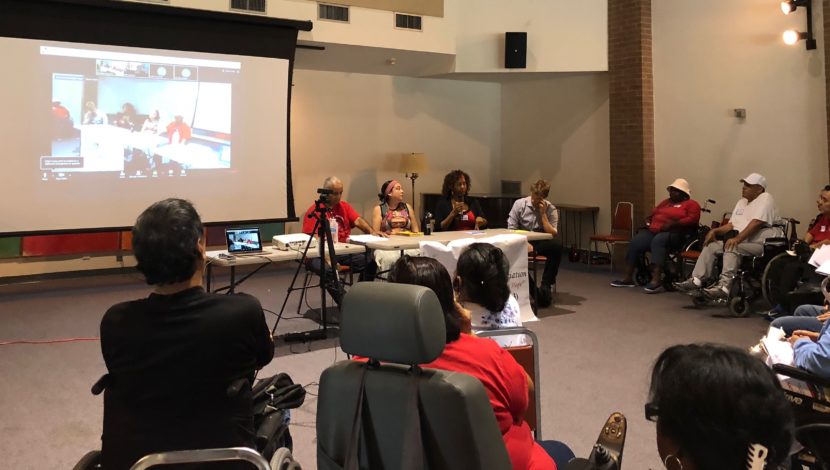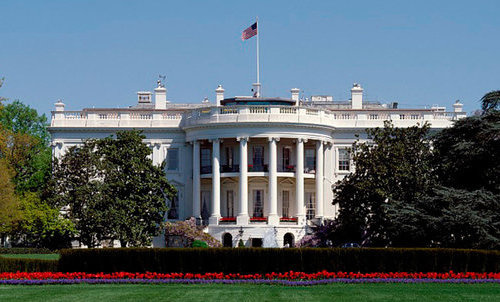The Unitarian Universalist Service Committee advances human rights through grassroots collaborations.
Hurricane Harvey: One Year Later

By on August 24, 2018
One year ago, on August 25, 2017, the most powerful storm to hit the United States in more than a decade bore down on southeast Texas and caused massive flooding. In the end, when the waters receded, 13 million people were affected, 88 people lost their lives, and more than 240,000 homes, and up to 1 million vehicles were damaged. Like most disasters, the communities that were already struggling were most impacted.
UUSC responded by partnering with local organizations addressing the needs of the communities most at risk, with the least access to traditional aid, government assistance, or insurance coverage—namely, undocumented immigrants, people living in extreme poverty, and people with physical disabilities. Through the UU College of Social Justice, we also organized a service-learning journey in Houston in March and have plans to lead additional trips in the future.
In July, I sat in on an event organized by our partner, Living Hope Wheelchair Association, which provided a platform for the people affected by Harvey, especially those who are most vulnerable and often marginalized, to share their stories with government leaders and elected officials. The event started with a prayer and followed with stories from the early days of the storm up until the present. We heard from people trapped in mobile homes with limited mobility, fearful for their lives as the water rose when Harvey let loose over Houston.
We listened to individuals displaced from their homes and who have spent the past 11 months staying in cramped conditions with friends or family. We centered the voices of people still living in homes that are in disrepair and contaminated with mold. We also heard stories of how misinformation, a lack of assistance, and feelings of mistrust and disrespect grew among those who had to deal with the government and large nonprofit bureaucracies.
A year later, it is the poorest households who appear to be struggling the most as they face barriers to assistance uncommon in more affluent communities. This is due in part to pre-existing conditions such as structural racism, ableism, and policies that criminalize immigrants and communities of color. For example, many immigrants did not apply to FEMA or other sources of assistance for fear of repercussions given the current anti-immigrant political environment.
There are also processes and requirements in the provision of aid that leave people out. For example, UUSC partner West Street Recovery has found that many families have applied for assistance only to discover that the deed to the home they live in is not in their name, either due to predatory financing schemes common in lower-income communities or family arrangements where the person paying the mortgage is not necessarily the person who technically owns the home. Since all of the major rebuilding programs require that the name of the person applying for assistance match the name on the deed of the house, they are ineligible for the traditional forms of assistance.
Others are excluded because they are not able to afford their property taxes and maintain insurance. And many do not have the language or understanding necessary to navigate the procedural and bureaucratic processes required to access assistance. Living Hope echoes this and has found that there is a lack of intentional strategies to effectively do outreach and include historically marginalized communities such as working class women, people of color, and people with disabilities. Without this, a large segment of the affected population has not received adequate support post-Harvey. There is much left to be done to ensure justice and accountability. In the months ahead, UUSC will continue to partner with and support groups that serve these communities.
On the one-year mark of Harvey, several of our partners along with local environmental and social justice organizations will gather with Houston residents for a People’s Tribunal on Hurricane Harvey Recovery to draw attention to Harvey’s lasting impact on Houston. The two-day event will unpack how the housing, immigration, labor, and environmental crises facing the city are part of global climate change trends already impacting the city’s most vulnerable populations. It will also serve as a grassroots reckoning of government and corporate neglect that caused Harvey’s flooding to disproportionately impact low-income and vulnerable communities in the Gulf region.
We applaud these efforts and look forward to continuing to advance equitable recovery efforts in the months ahead. As we do, we will follow the guidance of Pancho from Living Hope, who reminded us that, “We must ask ourselves how we can be bridges to access for all, especially those who are more marginalized, because if we are not part of the bridge we can become part of the barrier.”
Read This Next
UUSC Recommendations for the Global Compact on Migration
UUSC staff offer remarks at the Second Informal Thematic Session for Global Compact on Migration at the United Nations Headquarters in New York on May 23, 2017. Read More →
